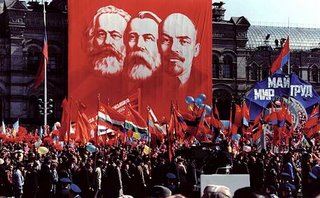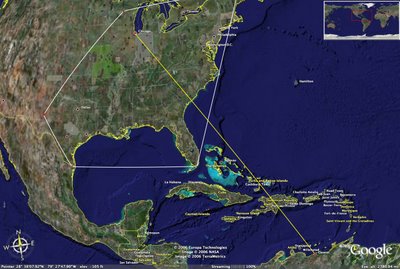
So apparently on May 1st, 2-3 million illegal immigrants are taking the the streets to "demand" amnesty. Demand? Are these people going out of there way to try and make me mad? Like I said before, they really need to get organized enough to get their PR function under control, because I'm guessing such "demands" are going to go over about as well as waving Mexican flags at the rally.
And they said you couldn't round up 12 million people? Looks to me like we can cut the number to 9 million by Tuesday! :)
In related news, I caught this quote in the AP story about the upcoming protests:
"Organizers have timed the action for May Day, a date when workers around the world traditionally have marched for improved conditions."
No surprise, but this is a mostly true statement shrouded by information they don't give you. May Day was a day associated with labor marches in the late 1800s. In more modern history, May Day is associated with shows of stregth by hard line Communist and Socialist governments. Given the earlier article I shared on the association between these "immigration" protests and communism, I guess this shouldn't be a surprise.
From the wikipedia:
"In the 20th century, May Day received the official endorsement of the Soviet Union; celebrations in communist countries during the Cold War era often consisted of large military parades and shows of common people in support of the government."
And in case you still don't believe me, you can look at this Immigrant Rights Action Packet, brought to you by the Communist Party USA. Nice.
In fact, the photo shown here was the very first result when I searched for "May Day Parade" on Google.
You know... I can't help but think about this sudden huge push for communism all around us, while at the same time a push for religious fascism in the middle-east... And now for a history lesson:
*Way* back in the day - the days of the Roman Empire that is, there was also a time when the folks back at home lost interest in the empire of Rome, wanted to let outsiders do all their work (including, incidentally, the work of the army), and worry about problems back "at home". That focus led Rome to be the first state to impose a property tax that fed the earliest of welfare systems. Meanwhile, the Roman defenses failed, Rome was overrun by Germanic nations and Mongol raiders, whose goal was to steal the riches of Rome for themselves. In the end, Rome fell, the raiders squandered their new wealth away, and it took the western world 1000 years to recover. That recovery was basically a backwards cycle from what these communist types are suggesting we do now.
First it was anarchy, then feudalism emerged, which is really nothing more that socialism among many very small city-states, then mercantilism and the start of capitalism, monarchy, constitutional monarchy, and eventually capitalism. Not that it was all smooth getting through that, mind you, but that's the general flow if you look at the 1000 year period from the fall of Rome to the Renaissance.
Not by coincidence, Rome was a largely capitalistic state, and even during the time of the Caesars, was run by-and-large as a states republic. The individual provinces largely governed themselves, but were in fact part of the Empire. It wasn't wholly unlike the way states function in the United States, although it would have been more similar in earlier US times than now where the federal government holds most of the power.
Anyway, now, right here in the U.S., I see people who believe we "need" all this foreign labor because we won't do the work ourselves... taxes are higher than they've ever been, and the solution to cash shortages is seemingly always higher taxes... and there's this massive push by those that want our wealth to hand it over -- to "demand" that we accommodate them -- supported by those whose underlying, flawed, philosophy thinks that by taking wealth and passing it around that we'll all move forward.
But history tells us that they'll squander those resources, and civilization will slide backward for centuries before it recovers. Alright, end of history lesson. I guess I should add "history" to the list of classes that I feel everyone should be required to go through each year until they understand it. The other two are: civics and economics. If everyone understood how the government worked, understood basic economics, and had some historical perspective, I believe this country would be a much better place.






























